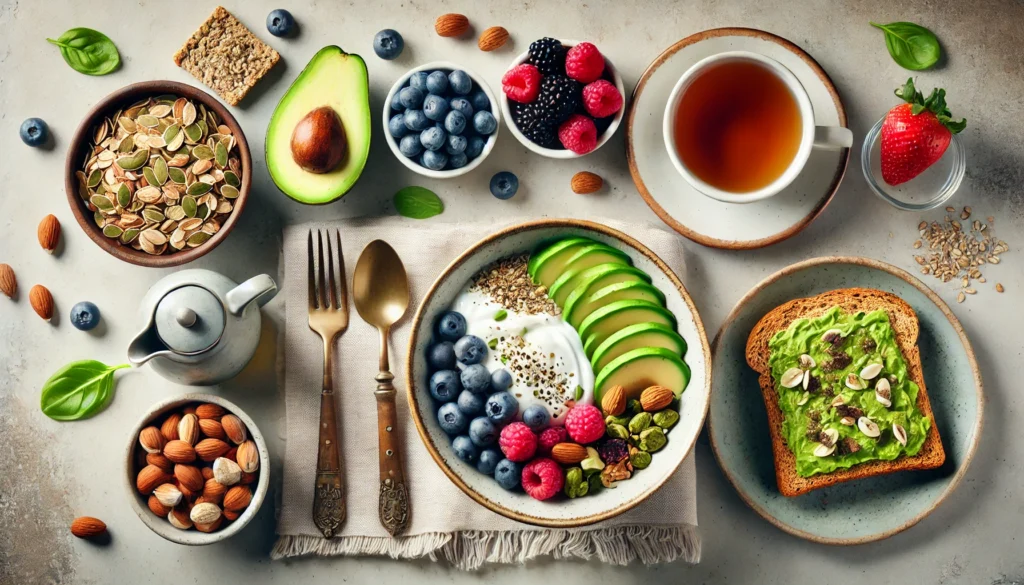Mental wellness is intricately tied to the foods we consume. The connection between diet and mental health is a burgeoning field of research, with an increasing body of evidence suggesting that what we eat can significantly impact our mood, cognitive function, and overall psychological well-being. In this article, we will explore some of the top nutrient-rich foods that can contribute to a healthy brain diet, enhance mental health, and improve cognitive focus.
You may also like: Memory-Boosting Foods You Should Try Today
The Science Behind Mental Health Foods
Before we delve into specific foods, it’s essential to understand the science behind how diet influences mental health. The brain, like any other organ, requires a constant supply of nutrients to function optimally. Neurotransmitters, which are chemicals that transmit signals in the brain, are directly affected by the nutrients we consume. For instance, serotonin, often dubbed the “feel-good” neurotransmitter, is synthesized from the amino acid tryptophan, found in various foods.
Nutrients and Neurotransmitter Synthesis
Neurotransmitters are the brain’s communication chemicals, and their synthesis depends heavily on dietary intake. Tryptophan, an amino acid found in foods like turkey, dairy, and nuts, is crucial for producing serotonin. This neurotransmitter plays a significant role in mood regulation and overall feelings of well-being. Without adequate tryptophan, serotonin levels can drop, potentially leading to mood disorders such as depression.
The Role of Healthy Fats
The brain is composed largely of fat, and consuming healthy fats is crucial for maintaining its structure and function. Omega-3 fatty acids, found in fish and some plant oils, are particularly vital. They help build cell membranes in the brain and have anti-inflammatory properties that protect neural tissues. A diet lacking in these essential fats may impair cognitive functions and emotional stability.
Antioxidants and Cognitive Protection
Antioxidants, vitamins, and minerals also play pivotal roles in protecting the brain from oxidative stress and supporting cognitive functions. Oxidative stress occurs when there is an imbalance between free radicals and antioxidants in the body, leading to cellular damage. Antioxidants found in fruits and vegetables neutralize free radicals, thus safeguarding brain health and enhancing cognitive performance.
Omega-3 Fatty Acids: The Brain’s Best Friend
Omega-3 fatty acids are essential fats that have garnered considerable attention for their role in brain health. These fats, particularly EPA and DHA, are found in high concentrations in the brain and are crucial for cognitive function and emotional health. Studies have shown that omega-3s can help reduce symptoms of depression and anxiety, making them an indispensable component of a mental health-focused diet.
Understanding EPA and DHA
Eicosapentaenoic acid (EPA) and docosahexaenoic acid (DHA) are the two main types of omega-3s critical for brain health. EPA is known for its anti-inflammatory properties, which can alleviate symptoms of depression by reducing brain inflammation. DHA, on the other hand, is a major structural component of the brain and retina. Adequate levels of DHA are associated with improved cognitive function and reduced risk of neurodegenerative diseases.
Impact on Mood and Mental Health
Numerous studies have linked omega-3 intake with improved mood and mental health. Populations with high fish consumption, which is rich in omega-3s, tend to have lower rates of depression. Supplementing with omega-3s has been shown to reduce symptoms in individuals with mood disorders, providing a natural alternative to traditional antidepressants.
Best Sources of Omega-3s
Incorporating omega-3-rich foods into your diet can be simple and delicious. Fatty fish like salmon, mackerel, and sardines are among the best sources. For vegetarians or those allergic to fish, plant-based options include walnuts, flaxseeds, and chia seeds. Ensuring a regular intake of these foods can support cognitive health and emotional well-being.
Antioxidant-Rich Foods: Protecting the Brain
Oxidative stress can lead to inflammation and damage brain cells, which is why consuming foods rich in antioxidants is vital. Antioxidants combat free radicals, which are unstable molecules that can cause cellular damage. A diet high in antioxidants can help reduce the risk of neurodegenerative diseases and improve cognitive function.
How Antioxidants Work
Antioxidants neutralize free radicals, preventing them from causing harm to cells, including neurons. This protective effect is crucial for maintaining the integrity of brain cells and supporting long-term cognitive health. Regular consumption of antioxidant-rich foods can bolster brain resilience against age-related decline.
Benefits Beyond Brain Health
While antioxidants are pivotal for brain health, their benefits extend to overall physical health. They can reduce inflammation throughout the body, lower the risk of chronic diseases, and enhance immune function. A diet rich in antioxidants is a cornerstone of a holistic approach to health and wellness.
Top Antioxidant Sources
Berries, such as blueberries and strawberries, are powerhouse sources of antioxidants. Dark chocolate, consumed in moderation, also offers a rich supply of flavonoids, a type of antioxidant. Vegetables like spinach and artichokes, along with nuts like pecans, provide additional antioxidant benefits that support brain health.
The Power of Whole Grains
Whole grains are a significant source of complex carbohydrates, which provide a steady supply of glucose—the brain’s primary energy source. Unlike simple carbohydrates, whole grains release glucose slowly into the bloodstream, ensuring a consistent energy supply and improving focus and concentration.
The Importance of Complex Carbohydrates
Complex carbohydrates are broken down slowly, providing sustained energy without the spikes and crashes associated with simple sugars. This steady energy release is vital for maintaining concentration and cognitive performance throughout the day. Whole grains, rich in fiber, also support digestive health, which can indirectly benefit mental well-being.

Whole Grains and Mood Regulation
The slow digestion of whole grains helps stabilize blood sugar levels, which can have a profound impact on mood. Fluctuations in blood sugar can lead to irritability and mood swings, whereas a diet rich in whole grains promotes emotional stability and reduces anxiety.
Diverse Whole Grain Options
Incorporating a variety of whole grains into your diet can be both nutritious and enjoyable. Quinoa, brown rice, oats, and whole wheat bread are versatile options that can be easily included in meals. These grains not only provide energy but also contribute essential nutrients like B vitamins and magnesium, which are crucial for brain health.
The Role of Fermented Foods
The gut-brain axis is a bidirectional communication system between the gut and the brain. Emerging research suggests that a healthy gut microbiome can positively influence mental health. Fermented foods are rich in probiotics, which can help balance the gut microbiota, potentially leading to improved mood and cognitive function.
Exploring the Gut-Brain Connection
The gut-brain axis highlights the intricate relationship between digestive and mental health. The gut microbiome produces neurotransmitters such as serotonin, which can directly impact mood and cognitive processes. A balanced gut microbiota is essential for mental well-being and reducing the risk of mood disorders.
Probiotics and Mental Health
Probiotics, beneficial bacteria found in fermented foods, play a crucial role in maintaining gut health. They can help alleviate symptoms of anxiety and depression by promoting a healthy balance of gut bacteria. Consuming probiotic-rich foods can support mental wellness by enhancing gut-brain communication.
Incorporating Fermented Foods
Adding fermented foods to your diet can be a flavorful way to boost gut health. Yogurt and kefir are popular options that provide a rich source of probiotics. Sauerkraut and kimchi offer a tangy addition to meals, while also contributing to improved digestive and mental health.
Leafy Greens: Nutrient Powerhouses
Leafy greens are packed with essential nutrients like folate, vitamin E, and vitamin K, which are vital for brain health. Folate is necessary for the production of neurotransmitters, while vitamin E and K protect the brain from age-related decline.
The Nutritional Benefits of Folate
Folate, a B-vitamin found abundantly in leafy greens, is crucial for brain function and mental health. It aids in the production of neurotransmitters that regulate mood and cognitive processes. Adequate folate intake can reduce the risk of depression and support overall mental wellness.
Vitamins E and K: Brain Protectors
Vitamin E, an antioxidant, helps protect brain cells from damage caused by free radicals. It is linked to the prevention of cognitive decline and improved memory function. Vitamin K plays a role in brain cell signaling and neuronal health, contributing to cognitive resilience.
Top Leafy Green Choices
Incorporating leafy greens like spinach, kale, and Swiss chard into your meals can provide a significant boost to brain health. These greens are versatile and can be added to salads, smoothies, or cooked dishes, ensuring a nutrient-rich diet that supports mental clarity and emotional well-being.
The Benefits of Nuts and Seeds
Nuts and seeds are excellent sources of protein, healthy fats, and antioxidants. They are particularly rich in vitamin E, which has been linked to cognitive health and the prevention of cognitive decline. Regular consumption of nuts and seeds can support mental sharpness and brain function.
Nutritional Profile of Nuts and Seeds
Nuts and seeds offer a unique combination of nutrients that benefit brain health. They provide healthy fats, particularly omega-3 fatty acids, which support cognitive function. Additionally, they are rich in antioxidants and vitamins that protect brain cells from damage and aging.
Impact on Cognitive Function
Regular consumption of nuts and seeds has been associated with improved cognitive performance and memory retention. The combination of healthy fats and antioxidants in these foods supports neuronal health and enhances brain efficiency, contributing to sharper mental acuity.

Varieties to Include in Your Diet
Almonds, walnuts, pumpkin seeds, and sunflower seeds are excellent options to incorporate into your diet. They can be eaten as snacks, added to salads, or used in baking. These nutrient-dense foods offer a delicious way to bolster brain health and support overall mental wellness.
Dark Chocolate: A Sweet Boost for the Brain
Dark chocolate, when consumed in moderation, can be a delightful addition to a brain-healthy diet. It contains flavonoids, caffeine, and antioxidants, which can enhance cognitive function, improve mood, and boost focus.
Flavonoids and Brain Health
Flavonoids, a type of antioxidant found in dark chocolate, have been shown to improve blood flow to the brain. This enhanced circulation supports cognitive function and may reduce the risk of neurodegenerative diseases. Regular consumption of flavonoid-rich foods can promote long-term brain health.
The Role of Caffeine and Antioxidants
Dark chocolate contains moderate amounts of caffeine, which can enhance alertness and concentration. Its antioxidants, particularly polyphenols, help protect brain cells from oxidative stress. These compounds work together to support mental focus and elevate mood.
Choosing the Right Dark Chocolate
When selecting dark chocolate, opt for varieties with at least 70% cocoa content to maximize health benefits. Consuming it in moderation, such as a small square a day, can provide a sweet treat while supporting cognitive function and emotional well-being.
Conclusion: Integrating Nutrient-Rich Foods into Your Diet
Incorporating these nutrient-rich foods into your diet can pave the way for better mental wellness and improved cognitive function. While no single food can act as a magic bullet for mental health, a balanced diet rich in the nutrients discussed above can play a significant role in supporting overall brain health.
Holistic Lifestyle Approaches
When considering dietary changes, it is essential to approach them as part of a holistic lifestyle that includes regular physical activity, adequate sleep, and stress management. These lifestyle factors work synergistically with a nutrient-rich diet to enhance mental well-being and resilience.
Seeking Professional Guidance
For those seeking personalized advice, consulting with a healthcare professional or a registered dietitian can provide tailored recommendations to meet individual health needs. They can help design a diet plan that aligns with personal health goals and preferences, ensuring optimal mental health support.

Staying Informed and Empowered
By understanding the profound impact of diet on mental wellness, we can make informed choices that nurture our brains and support our emotional well-being. As ongoing research continues to unfold, staying informed about the latest developments in brain science and nutrition will empower us to optimize our mental health through the foods we eat.
Further Reading:
How Foods and Drinks Affect Our Mental Health
Food and mood: how do diet and nutrition affect mental wellbeing?
Can What You Eat Affect Your Mental Health?
Important Note: The information contained in this article is for general informational purposes only, and should not be construed as health or medical advice, nor is it intended to diagnose, prevent, treat, or cure any disease or health condition. Before embarking on any diet, fitness regimen, or program of nutritional supplementation, it is advisable to consult your healthcare professional in order to determine its safety and probable efficacy in terms of your individual state of health.
Regarding Nutritional Supplements Or Other Non-Prescription Health Products: If any nutritional supplements or other non-prescription health products are mentioned in the foregoing article, any claims or statements made about them have not been evaluated by the U.S. Food and Drug Administration, and such nutritional supplements or other health products are not intended to diagnose, treat, cure, or prevent any disease.


